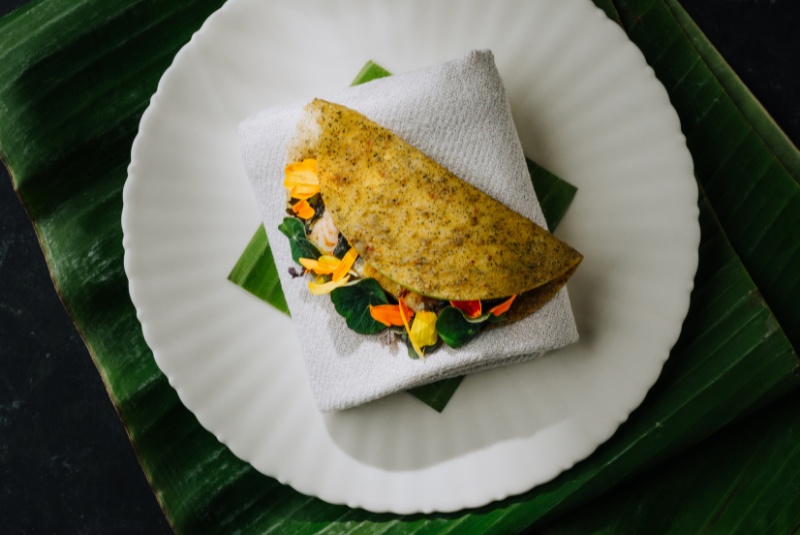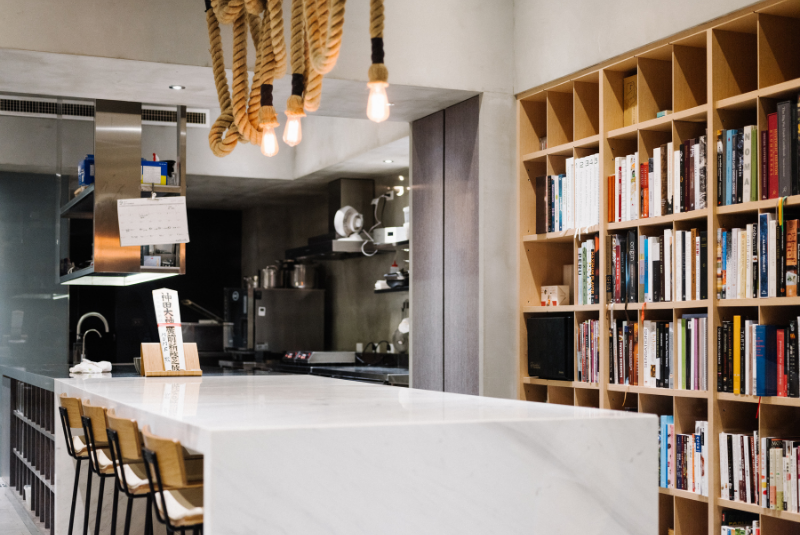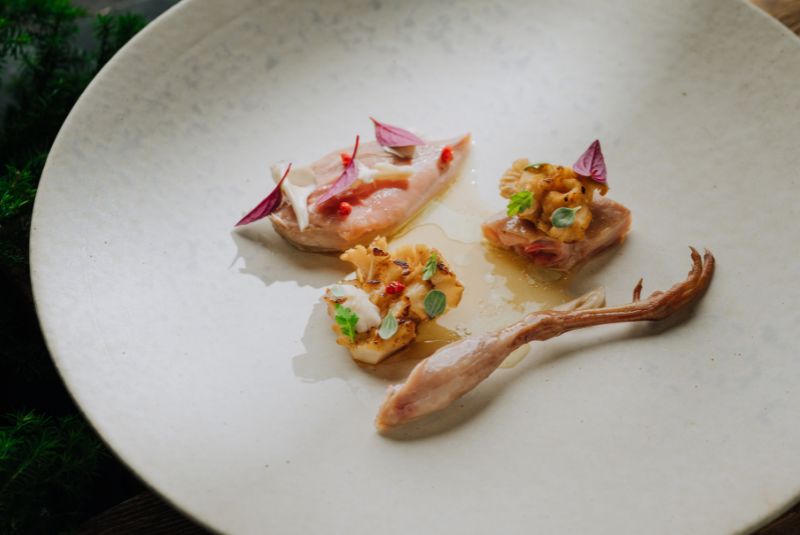A pioneer in the use of underrated Taiwanese ingredients and zero-waste cooking practices, Mume in Taipei was recognised with the Flor de Caña Sustainable Restaurant Award as part of Asia’s 50 Best Restaurants 2022. Chef-owner Richie Lin tells us in his own words what it has been like to transform the restaurant into a sustainable business, where he finds motivation to keep improving his practices and why we all need to be part of this burgeoning movement
I was born in Hong Kong, but in 2014, I moved to Taiwan. The island had so much to offer, but in Asia it's always been the underdog. At that point of my career, I was eager to learn and explore something new. That was the beginning of Mume, eight years ago. The initial idea was very straightforward: to create a farm-to-table restaurant that celebrates local ingredients and seasonality. Mume is named after the national flower of Taiwan, and its Chinese writing also shares the same characters with my mother’s name. It was an emblematic name to showcase what Taiwan has to offer, a symbol on the international stage.
The idea of Mume had a lot to do with my previous experience in restaurants, as most of them had embraced sustainability and taken it very seriously. Peter Gilmore from Quay [in Sydney] is one of the most important mentors in my career. What makes Quay’s cooking so special is that Peter has a passion for what is unique about Australian cuisine – that idea of finding your sense of place. Your cooking style might be very personal, but the ingredients are irreplaceable. That's the single most important lesson I learnt there. The sense of place in Scandinavian cuisine is very strong, so after Australia, I wanted to go to Denmark and experience it for myself. I went on to work at Noma, where that concept is elaborated to a different scale, because the establishment is even bigger.
One of Mume's popular dishes: Taiwanese eel with a pancake of mixed, wild and dried spices
When we opened, we spent the first three to four years just trying to learn about Taiwan, about the island and its seasonality, what it has to offer, what's special about it. We slowly built up our database. Things started to pick up about three or four years ago. A big turning point was when we were awarded as one of Asia’s 50 Best. Taipei got a lot of sudden attention, so we had the opportunity to engage in international exchanges, and also to invite chefs to come to Taiwan. That process really shaped the restaurant and our cooking philosophy and gave me a chance to think about what we wanted to do with sustainability.
We weren’t experienced enough or mature enough, so we had to learn from mistakes along the way, but over time, we’ve been evolving our practices. From the beginning, the first principle at Mume was that we wanted to use local ingredients – that was a must. So we started with 90% of the ingredients sourced locally, and then slowly increased every year. We are close to 100% now. We have a dedicated sourcing manager, which is quite rare in such a small restaurant setting, but we believe that is the core of Mume. Then our efforts extended into different areas. We started paying a lot more attention to food waste, so when we construct the menu, we try to minimise the wastage too. We aim to utilise every single part of the ingredient, and it shows in our menus. Zero waste has become an integral part of designing the dishes.
There’s a salad dish on our menu inspired by Michel Bras’ gargouillou. He was the
first one who created this kind of salad and was a pioneer of farm-to-table and the idea of hyper seasonality, where everything is freshly picked that morning. Although the seasoning, plating and everything else are our own, the dish is an homage to that idea. We change the salad every day according to what we receive, but the seasoning always stays the same. We toss the vegetables – some of which might be pickled or fermented – with fermented black beans that we dehydrate ourselves and cut into very small granules, like small umami explosions. Then we dress the salad with grapeseed oil to bind everything together. It's a very light seasoning, so you can still taste every single ingredient and the freshness of the produce. This dish is like a market tour: through it you get a very good sense of what's available in Taiwan right now.
The interior of the restaurant, which is located in the heart of Taipei
The team reuses trimmings or processes them into dehydrated products to extend their shelf life. We turn them into other products to create a second life for them, because they were previously considered trash. Buying some of these products would be cheaper than making them ourselves, but I'm very fortunate to have a team who really believes in what we're doing. They understand what we want to achieve and what we want to change in the industry, starting with our own restaurant.
Due to Covid, we started engaging with our local customers more, and a lot of people didn't know what we were doing. That was the lightbulb moment for me, because the more I engaged with Taiwanese guests, the more I realised that they didn't understand sustainability. We’ve never put much effort into marketing or letting people know what we are doing, because we felt like it’s just what we believe in. But I started to change my way of seeing this. I do want to do a bit more promotion to spread the word on sustainability and the efforts that we have been putting in for so long. If we don't tell anyone, it doesn't mean that the things we are doing are worth any less. But if by telling our story we can engage more people to join us and change common practices in the hospitality industry, then that is valuable.
Chef Lin sources his ingredients from local producers for dishes including 'Drunken Quail' with coral mushrooms and yellow wine
You can start from sourcing ingredients locally – not based on pricing, not based on convenience, not based on what’s socially accepted or the way that things have always been done. You can make a better choice, or at least a different choice. It's something that we all can do and something that we have to believe in. It’s a very simple concept. If you are Christian, you believe in Jesus. The same way, you can believe in sustainability or in whatever else you want; you just believe in what you're doing. I believe that everything that we do to nature and the earth is going to come back to us, or if not to us, to the next generation – and I have three kids.
We're very grateful to be recognised with the Flor de Caña Sustainable Restaurant Award, because Taiwan still has a lot of potential, especially as part of this movement towards becoming more sustainable. As part of the process of applying for the award, we put a lot of effort into giving evidence of what we’re doing, and as a result, we're starting to rethink some of the areas where we might have been lacking in the past. I have always believed that, as cooks, there's a lot more we can do than just be in the kitchen. There is a social responsibility attached that can be a little bit more difficult to execute. But if everyone does things a little bit differently, we can create a big change. It's simple, right?
The latest edition of Asia’s 50 Best Restaurants 2022, sponsored by S.Pellegrino & Acqua Panna, was announced on Tuesday 29th March at live ceremonies in Bangkok, Macau and Tokyo. Browse the website, join the community on Instagram, follow us on Facebook, visit us on Twitter and subscribe to our YouTube channel to stay up to date with the latest news and announcements.

